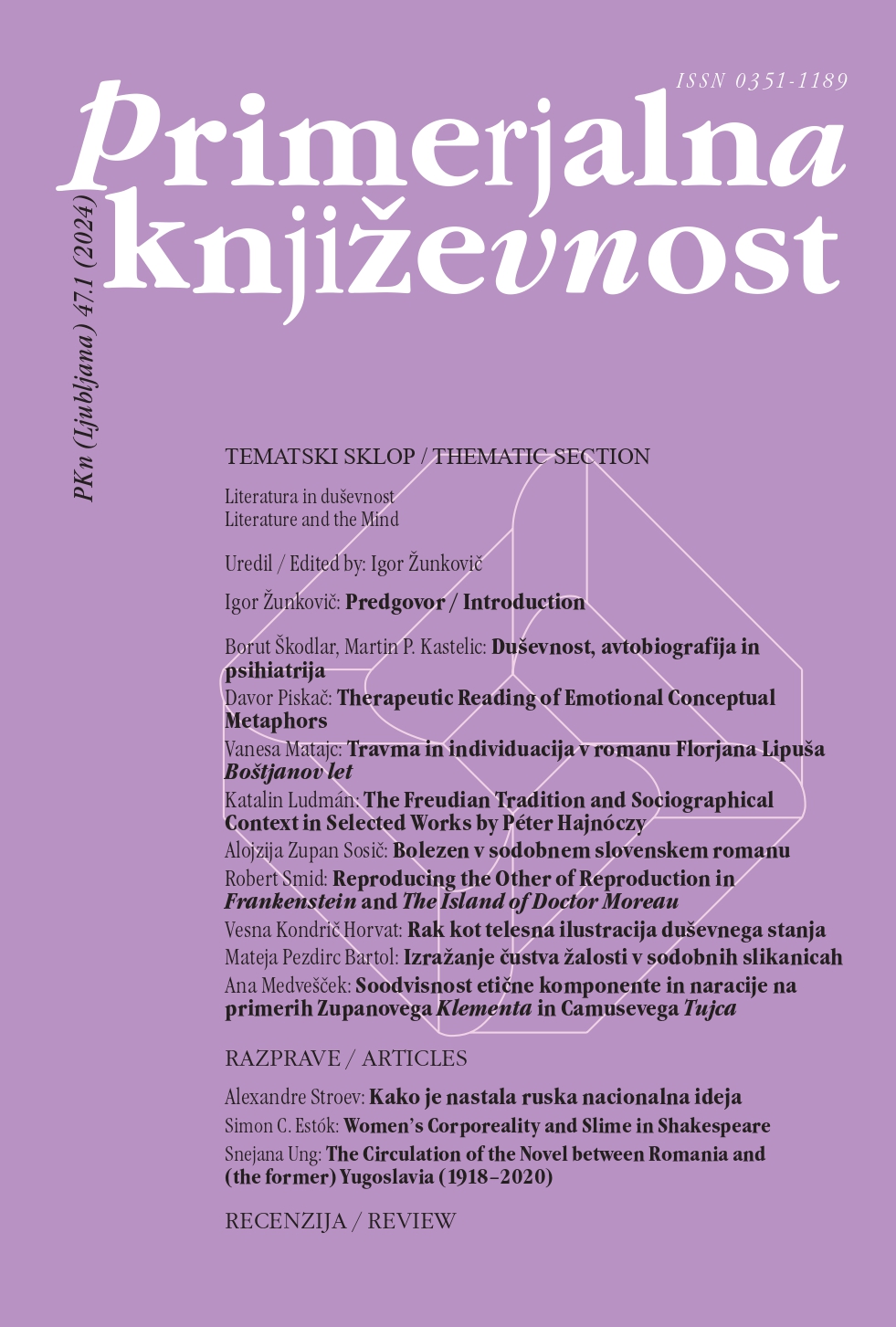The Interdependence of the Ethical Component and Narration in Camus’ The Stranger and Zupan’s Klement
DOI:
https://doi.org/10.3986/pkn.v47.i1.09Keywords:
literature and ethics, ethical literary criticism, narratology, narrative technique, existentialism, Camus, Albert: The Stranger, Zupan, Vitomil: KlementAbstract
This article discusses the way narrative elements (primarily the narrator and different types of discourse) influence the ethical potential of a literary work. Beside presenting three of the most important components of the ethical potential—the sense of the possible, development and consolidation of the identity as well as the sense of understanding and tolerance—it explores the reader’s ethical criticism that may occur on the external (regarding the author), intermediate (regarding the narrator), or internal (regarding the literary characters) level of the storytelling process. The Stranger by Albert Camus and Klement by Vitomil Zupan are ethically analyzed with regard to all three levels of the process of narration on the one hand and to the relations between the author, narrator, reader, and literary work on the other. Special focus is placed on the intermediate level of the storytelling process. Based on the chosen works that differ in narrators and types of discourse, the article explains different possibilities to impact the components of the ethical potential by introducing a model of the open, guiding, and propositional ethical component. Finally, it emphasizes the role of the reader or each individual reading and the subjective nature of how the analyzed possibilities of the ethical impacts can be realized.
References
Booth, Wayne C. Retorika pripovedne umetnosti. Prev. Nada Grošelj, LUD Literatura, 2005.
Camus, Albert. »Neverniki in kristjani«. Proti neredu sveta: kritični spisi, prev. Suzana Koncut in Jaša Zlobec, Mladinska knjiga, 2010, str. 57–93.
Camus, Albert. »Razmišljanje o giljotini«. Smrtna kazen: zbornik, ur. Jaša L. Zlobec, prev. Jure Potokar idr., Cankarjeva založba, 1989, str. 137–176.
Camus, Albert. Tujec. Prev. Jože Javoršek, Delo, 2004.
Kos, Janko. Literarna teorija. DZS, 2001.
Kos, Janko. »Zločin in kazen Vitomila Zupana«. Vitomil Zupan, ur. Aleš Berger, Nova revija, 1993, str. 7–20.
Matajc, Vanesa. »Eksistencializem v romanopisju Vitomila Zupana«. Primerjalna književnost, let. 21, št. 1, 1998, str. 53–74.
Meretoja, Hanna. The Ethics of Storytelling: Narrative Hermeneutics, History, and the Possible. Oxford University Press, 2018.
Nagel, Thomas. »What Is It Like to Be a Bat?« Mortal Questions, Cambridge University Press, 1992, str. 165–167.
Skrt Sivec, Nina. Etika in literatura v pripovednih žanrih med dokumentarnostjo in fikcijo. 2020. Filozofska fakulteta, Univerza v Ljubljani, doktorska disertacija.
Vasič, Marjeta. »Uvod«. Albert Camus, Tujec, DZS, 1994, str. 16–39.
Virk, Tomo. »Etična literarna veda med kakofonijo in pluralnostjo«. Primerjalna književnost, let. 40, št. 2, 2017, str. 13–32.
Virk, Tomo. Etični obrat v literarni vedi. LUD Literatura, 2018.
Zupan, Vitomil. Klement. Globus / Pomurska založba, 1985.
Zupan Sosič, Alojzija. Teorija pripovedi. Litera, 2017.


